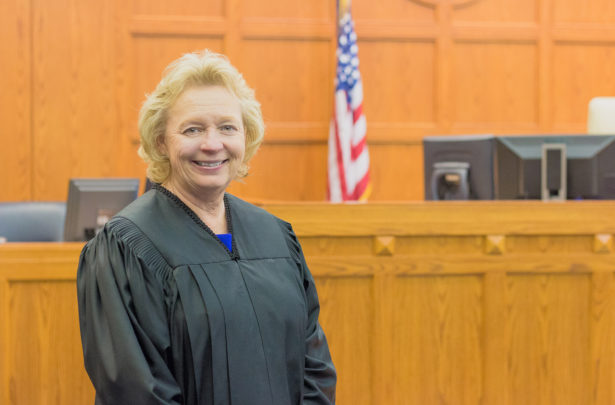By Margot Emery
At Pamela Reeves’ investiture in March as a U.S. District Court judge, it seemed only fitting for her husband, Knoxville Law Director Charles Swanson (Knoxville ’79), to address some 800 friends and associates gathered at Knoxville’s Bijou Theater to witness the event. Swanson told how Reeves’ journey to earning the title of “honorable” began with several other H’s—four, to be exact.
4-H—the youth development program whose H’s stand for head, heart, hands and health—prepared Reeves to be a judge.
“And we gave him so much grief about getting the H’s out of order,” says Reeves (Knoxville ’76, ’79) with a laugh. She agrees, though, with his assertion.
Growing up in the mountains of southwest Virginia and in Bluff City, Tenn., Reeves came from an economically challenged family. She says 4-H gave her opportunities to travel and to grow that would otherwise not have come her way.
“I would not be the person that I am today had it not been for 4-H. That was just an eye-opening opportunity to learn so much, including leadership skills and public speaking. It was hugely impactful.”
Caring high school teachers also shaped her. The mentors, three of whom were present at her investiture, helped her apply for scholarships and grants that made attending college possible. She came to UT and studied history. It wasn’t until midway through her senior year that Reeves decided to enter law school. She says she doesn’t second guess the decision.
“I always enjoyed the legal work. And getting involved in the federal legal world early on, as I
did, was fortunate. I really got to use my legal education as I dealt with constitutional issues and complex statutory issues like we see all the time in federal court.”
Later, alternative dispute resolution came to be a focus of her practice. “I began to see that there was a huge need to look at legal issues from the perspective of, ‘How can we solve this problem?’ as opposed to, ‘Let’s go to the courtroom and beat each other up.’ It’s sometimes possible to be a little creative outside the courtroom and help the parties work together to reach an agreement that satisfied all the parties.”
Reeves has had a career of firsts. She is the first female to serve on the federal bench in the Eastern District of Tennessee and also the first female president of the Tennessee Bar Association (TBA). She calls her tenure as president, and the unexpected realization she was serving as a role model, a high point of her career. But she and Swanson (also a former TBA president) take their greatest pride in their children. Both are headed toward careers in law.
“We joked that they didn’t get to go on a vacation where they didn’t have to wear name tags until they were 10. We took them along to so many TBA events when they were younger.”
While she says President Obama’s nomination of her to be a federal judge was a result of being in the right place at the right time, the process toward her confirmation certainly wasn’t. It took a year to travel through the system amid Congress’ nuclear option stalemate, sequestration and ensuing government shutdown. “It was not a process that I’d particularly want to go through again, but I survived.”
One thing that has surprised Reeves in her early months on the bench is the number of drug-related criminal cases she’s presided over.
“Many of the people I see in these trials are not educated. They just haven’t had a lot of opportunities, and it makes me realize just how important it is to reach people at every level with education so they don’t find themselves in a situation where they think their only resort to make money is getting involved in dealing drugs. It’s critical that we reach them with education and community and family support.”
Reeves says, once students reach high school, it’s vital that we teach them how to think and to constantly ask, “What are the opportunities for the future?”
For Reeves, success goes back to the support she received early on from her parents and her teachers and the leadership skills and opportunities she learned through 4-H.

